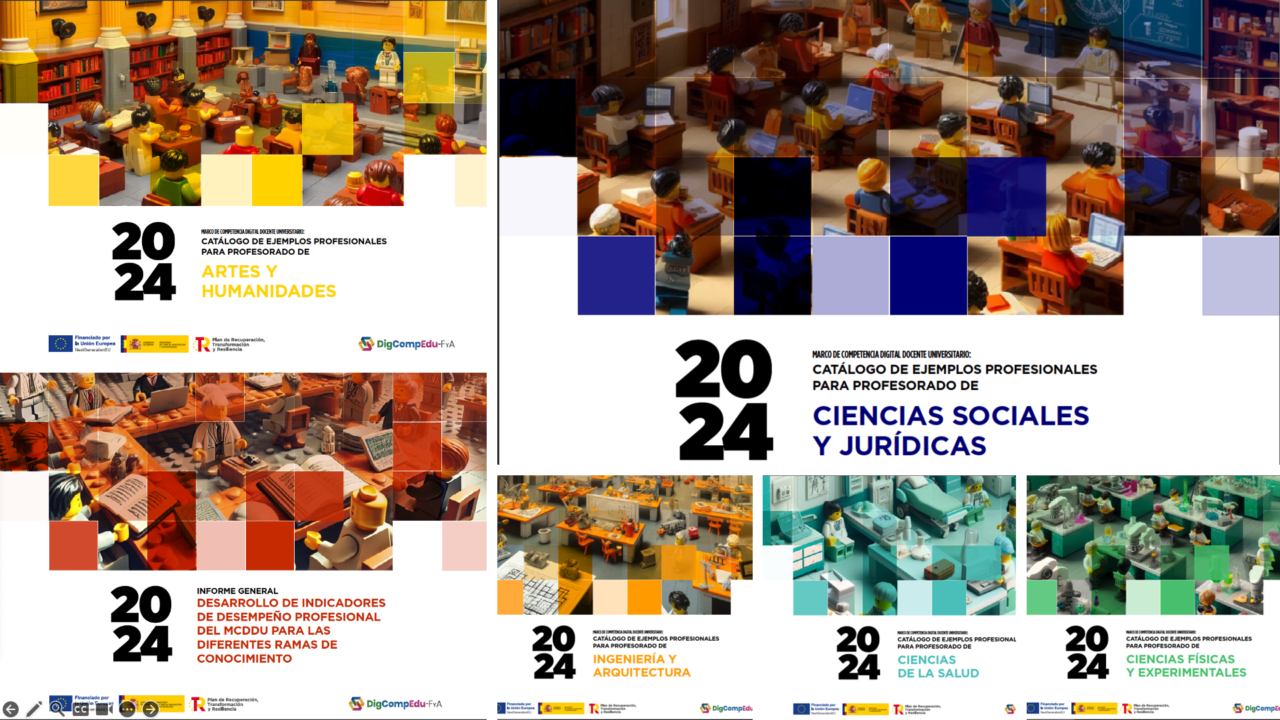As I mentioned in the April post, in December 2023 we published the University Digital Teaching Competence Framework (in Spanish: Marco de Competencia Digital Docente Universitario) ( from here on, MCDDU) as part of the DIGCOMPEDU Formación y Acreditación (DigCompEdu FyA) project.
During the validation of the framework, one of our primary concerns was the limited or non-existent adoption of such a document among those it affects: not only the teaching staff but also all the decision-makers at all levels who, in one way or another, influence university digital teaching competencies.
From this concern, and thanks to the work of many people in the consortium, we have created five catalogues—one for each branch of knowledge (Arts and Humanities, Physical and Experimental Sciences, Health Sciences, Social and Legal Sciences, and Engineering and Architecture)—that compile examples of how each area and sub-area of the framework (the MCDDU) materialize in the daily life of a university professor from each of these branches.

The catalogues were developed between November 2023 and February 2024 through a focus group strategy with professionals teaching at the various universities involved in the DigCompEdu-FyA project. A total of 100 teachers worked in 15 groups—three groups for each branch of knowledge—to cover and complete examples of the six areas of the MCDDU.
Once the focus groups concluded in February, we worked to c
omplete the compilation. Also, we tried to shape them in a way that made them readily accessible to anyone who wanted them. And now, finally, they are open and available to anyone who wants them:
MCDDU PROFESSIONAL EXAMPLES CATALOGUES for UNIVERSITY TEACHING STAFF
-
Social and Legal Sciences: http://hdl.handle.net/10201/142949
-
Arst and Humanities http://hdl.handle.net/10201/142981
-
Health Sciences http://hdl.handle.net/10201/142982
-
Physical and Experimental Sciences: http://hdl.handle.net/10201/142958
-
Engineering and Architecture | http://hdl.handle.net/10201/142985
In addition, we have created a report detailing how and why the catalogues were made, in case it can be helpful for similar initiatives. You can find it here:
General Report: http://hdl.handle.net/10201/142950
All documents are under a **CC NC SA license**, which aims to open up the project materials and allow us to continue growing. Please note that all these documents are currently only available in Spanish. However, we believe they can inspire similar initiatives in other contexts and languages.
As stated in the catalogues, these examples are ONLY AN INITIAL APPROACH. We hope they inspire us to perform or enrich certain aspects of teachers’ work and to create new examples. The more examples we have, the better.
We initially develop this competence in our institutions, and our perception of it will change significantly. These catalogues are only intended to serve as an initial help. The examples are temporary because they are based on constantly evolving tools, and there are errors we should improve, but we thought it was essential to take this first step. We will have to do the rest together.
Of course, none of this would have been possible without the spectacular work of the people from the universities that make DigCompEdu FyA, the teachers who participated in the focus groups and my colleague Nuria Vanaclocha, who is doing a spectacular job. In addition, we have had José Martínez from hando.es for the design, who is always wonderful.
